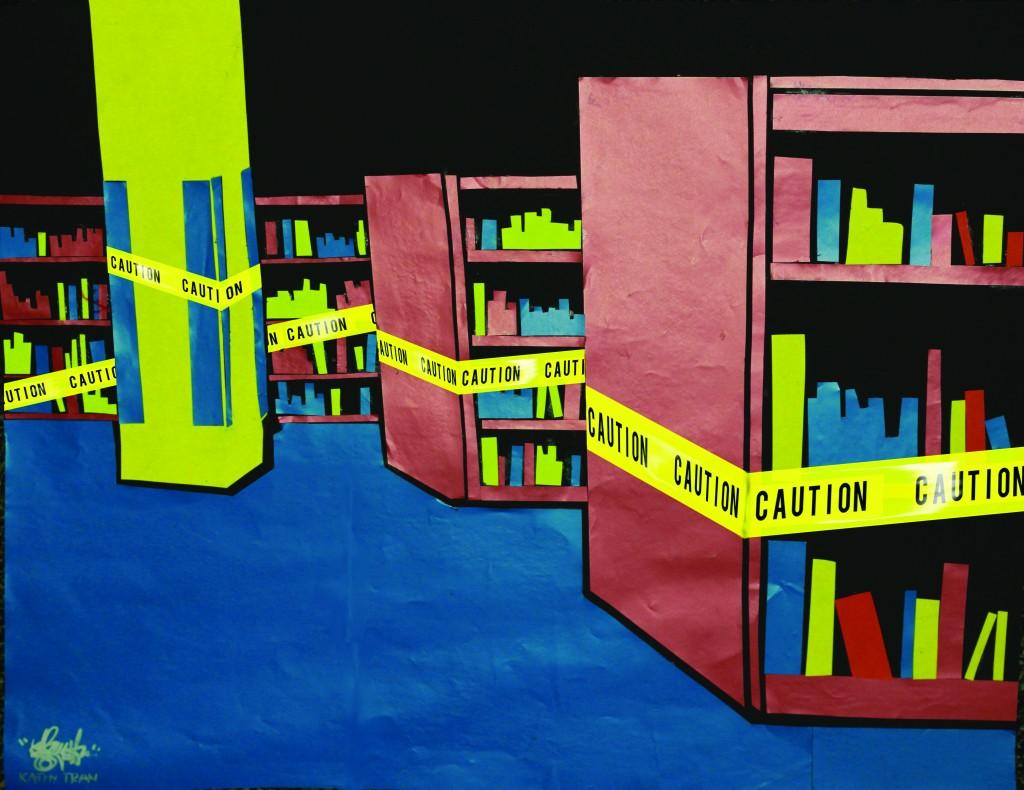By Rodney Blu
Managing Editor
I remember the shuddering disdain seemingly felt universally when, dawning each fall semester, high school English-Language Arts teachers announced the year’s assigned reading. I was particularly put-off by my 11th-grade obligation to one Ray Bradbury’s Fahrenheit 451, recalling specifically an anarchic desire to set the paperback ablaze in the fashion depicted in its own pages. Though then unaware, in simply blundering half-coherent through its leaves – or any other assigned reading, for that matter – I and students across the country were engaging in revolution, in silent protest heralded by groups of impassioned librarians against a growing sentiment that works of controversial nature ought not be accessible to minds as impressionable as American teens.
This year marked the thirtieth anniversary of the American Library Association’s annual Banned Book Week. Since 1982, the nationally recognized observation has occupied the last week of September as librarians, teachers and the few remaining whose readership extends further than Facebook statuses and screaming tabloid headlines bordering grocery store check-outs recognize and applaud the most controversial and disputed books in American Literature.
Among its enthusiasts are Brookhaven access services librarian Ann Coder and circulation assistant Elaine Denahan, M Building’s most prominent patrons who rank “the freedom to read” among the most quintessential of American rights.
“The library profession has always been an advocate of the freedom to read and opposed to censorship.” Coder said, “We celebrate what’s been banned to create awareness that this is something we do not support.”
Ironically, the constitutional amendment that supports literary liberty is the same that allows the yearly challenging of books deemed inappropriate, insensitive or contrary to religious convictions – their most frequent indictments. Parents and, most recently, organizations such as Parents Against Bad Books In Schools confront the ALA as well as school boards, city councils and bookstores regarding between 400 and 500 titles every year. The annual list is primarily comprised of the most often challenges to literature in individual circumstances throughout the country. The works questioned range from classics such as Scott Fitzgerald’s “The Great Gatsby” and George Orwell’s “Animal Farm” to modern cantons like “ttyl”, “ttfn” and “l8r g8r” by Lauren Myracle – a young adult series conveyed entirely in instant messenger conversations – and, surprisingly, the literary inspiration of the widely celebrated 2012 film, “The Hunger Games”.
“Everything from “Harry Potter” to, probably the best known, “Ulysses” – which was kept from being published for a number of years – as well as “The Adventures of Huckleberry Finn” have been among the most high-profile bans.” Coder said. Some denunciations come off as laughable in their absurdity, Denahan said, “I think it’s so silly, “Little Red Riding Hood” had a bottle of wine in her basket and the book was banned because of that.”
Librarians and other activists, however feel an obligation to the first amendment greater than the admonitions of parents and interest groups. Banned books, in their eyes, represent a symbol of the endless fight for expression, as the list doesn’t pose much of a threat outside the single institution confronted.
“The lists aren’t official and being university librarians, we’re not working around most of them,” Denahan said.
The fact that some titles have been deemed contraband may, in fact, benefit the affected. Many of the titles listed are or have been bestsellers at some point. “The Catcher In The Rye”, “The Da Vinci Code”, “Charlotte’s Web”, “To Kill A Mockingbird” and, most recently, “Fifty Shades of Grey” have all frequently appeared on banned book lists and have individually sold over 30 million copies worldwide.
What the ALA, Ann Coder, Elaine Denahan and supporters nationwide aim to communicate through the yearly tribute to controversial titles is not only the long-standing American tradition of the irrefutable freedom of expression and respect of the arts, but encouraging open thought and opinion, where others would still place stipulations on what is as essentially core an American value as pursuit of happiness – the freedom to read.
“Banned book week gives people the opportunity to say, ‘Hey, let me make my own mind up. Let me make my own decisions,’” Denahan said, “I think banned books week creates an open-mindedness in people – maybe it’s good that we read things that others don’t want us to.”







